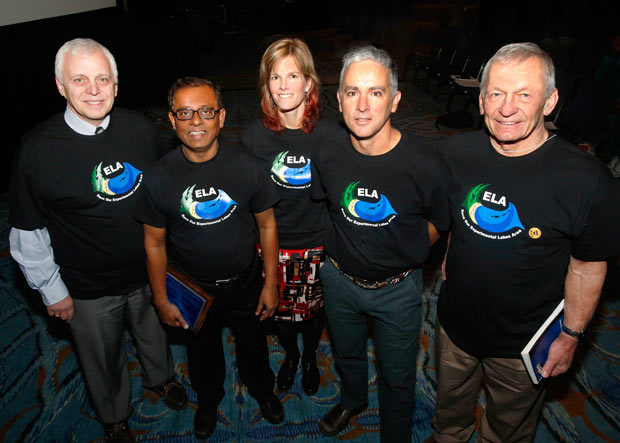

NEW ORLEANS – Environment – ELA Supporters dump lab coats in New Orleans. On the first day of the annual meeting of the Association for the Sciences of Limnology and Oceanography (ASLO) yesterday in New Orleans, the current president, the president-elect, , and the two prominent aquatic scientists giving opening addresses were not dressed in the usual attire.
ELA Support has grown
The scientists were not dressed for Mardi Gras. They were not wearing suits and ties. The scientists were all wearing T-shirts that said “Save Our ELA”.
This was the first ASLO meeting since the Government of Canada announced the closure of the Experimental Lakes Area (ELA), scheduled for March 31.
“As we kick off this exciting 2013 ASLO meeting here in New Orleans, it is sobering for me to think that the core contributions from ELA that have been stalwart components of five decades of ASLO meetings will someday be no more”, said Dr. James Elser, ASLO President-elect. “The theme of the meeting is ‘Learning For The Future’.”
“How can we learn and thus assure the future of lakes without the ELA?” asked Elser.
Two former ELA scientists, Dr. Karen Kidd and Dr. David Schindler, were the featured speakers.
Dr. Kidd headed the only whole lake experiment on endocrine disrupters that has ever been done. She is now Canada Research Chair in Chemical Contamination of Food Webs at the University of New Brunswick, and is co-editor of a big UNEP/WHO report on endocrine disruptors that was released today.
“Dr. Kidd’s cutting-edge experiment with endocrine disruptors in whole lakes at ELA indicates that we have a huge problem on our hands with such chemicals”, said Dr. David Schindler, Killam Memorial Chair and Professor of Ecology in the Department of Biological Sciences at the University of Alberta in Edmonton, Canada.
“Fish populations are clearly at risk in rivers in heavily populated areas because of inputs of municipal wastewater discharges. That is why it is of interest to this international society of water experts. “
But even more than highlighting a specific environmental problem, there was concern over the lack of action by Canada’s Department of Fisheries and Oceans (DFO) in continuing the ELA and the unique type of research that is carried out there.
“It seemed like every talk in the plenary today used pieces of science derived from or inspired by ELA science,” said Dr. John Downing, current ASLO President. “The closure of ELA at a time when pressure on good water is increasing exponentially is a tragedy for the public good and the scientific enterprise.”
While DFO has been saying for months that it hopes to see the ELA transferred successfully to a new operator who will ensure that the whole ecosystem approach will continue to be used, there is still no new operator in place.
“While we still hope that the government will reverse its decision, at the very least we hope that the time line will be extended for long enough that the complex job of transferring the ELA to a new operator can be successfully accomplished,” said Dr. Britt Hall, U. of Regina professor and head of the Coalition to Save ELA. “We hope that as many attendees as possible will buy our T-shirts and wear them. Even better, send one to your congressman or MP!”
Harper Government Announces Environmental Support
Funding for the projects, which totals $61.8 million in areas such as agriculture, transportation, mining and energy, is being provided through Sustainable Development Technology Canada’s (SDTC) SD Tech Fund™.
Our Government is doing its part to encourage innovation and the next wave of clean technologies to help protect our environment and create high-quality jobs,” said Minister Oliver. “Investment in projects such as these demonstrates our leadership in driving a vibrant clean technology industry in Canada.”
“Our Government’s investments in clean technologies are supporting innovation, jobs and Canada’s rapid transition toward a greener future,” said Minister Kent. “These new projects can only strengthen our position as a global leader in clean technology — something all Canadians can be proud of.”
Minister Oliver and Minister Kent met with representatives of some of the companies receiving funding today. They were joined by Dr. Vicky Sharpe, SDTC President and CEO.
“SDTC is proud to add these projects to its portfolio, now valued at more than $2 billion,” said Dr. Sharpe. “When purchased and used by Canadian industry, these technologies will enable a variety of sectors to increase their share of global markets. As Canada works to diversify its export markets, working with new trading partners in emerging countries, these innovative technologies will help make Canadian natural resources and products more globally attractive and competitive.”






